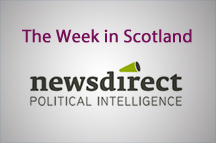 Clothes pressed and with clean pants and hankies, Scotland’s newly-elected MPs headed to London this week for their induction to the job. As they were getting to grips with the legendary ‘lost corridors’ of Westminster, the SNP group leadership were busy negotiating on what rights and benefits would be coming the way of their #Team56. At this point in the process, they have already moved into the third party’s offices (known as the “Irish corridor”) and third party whips offices. A major recruitment drive is also underway to get staff on board to provide the necessary support.
Clothes pressed and with clean pants and hankies, Scotland’s newly-elected MPs headed to London this week for their induction to the job. As they were getting to grips with the legendary ‘lost corridors’ of Westminster, the SNP group leadership were busy negotiating on what rights and benefits would be coming the way of their #Team56. At this point in the process, they have already moved into the third party’s offices (known as the “Irish corridor”) and third party whips offices. A major recruitment drive is also underway to get staff on board to provide the necessary support.
Alongside substantially-increased Short money, the potential to chair a couple of committees and enhanced speaking and questioning opportunities, they will also be looking for around four opposition supply days of parliamentary time. It will be a bittersweet moment for Nick Clegg’s ousted colleagues to watch the SNP park their backsides on benches formerly inhabited by the LibDems in opposition, given that some of them must now be regretting the decision to cross the floor in the first place.
 Appointments to promoted positions have also now started to emerge, a decision made easier for those parties who only returned a single Scottish MP. With David Mundell appointed as Secretary of State for Scotland, the Conservatives have been forced to enoble former special adviser, Andrew Dunlop, to fill the second chair. As a member of Thatcher’s policy team in the 1980s (specialising in tax and Scotland) he has been quick to distance himself from involvement in the poll tax. Understandably.
Appointments to promoted positions have also now started to emerge, a decision made easier for those parties who only returned a single Scottish MP. With David Mundell appointed as Secretary of State for Scotland, the Conservatives have been forced to enoble former special adviser, Andrew Dunlop, to fill the second chair. As a member of Thatcher’s policy team in the 1980s (specialising in tax and Scotland) he has been quick to distance himself from involvement in the poll tax. Understandably.
Another key appointment still to be filled is that of Advocate General, formerly held by LibDem peer Lord (Jim) Wallace of Tankerness. Speculation continues about whether this will spark another life peerage or whether it can be filled from the existing ranks. When asked about future roles, on the eve of the election, Baroness (Annabel) Goldie answered: "I have roses to grow and ploys to pursue...". It remains to be seen what the latter might consist of…
Electoral cycles
With the General Election now behind us, our forward planning immediately turns to the next electoral cycle and, oddly, the lack of any clear consensus on the likely term of the next Holyrood parliament. The founding legislation says four years, but this would put Scotland on a collision course with Westminster again in 2020, a fact acknowledged by the Smith Commission.
While the 2015/16 approach could be copied again, this doesn’t really solve the problem going forward. The recurrence issue could be addressed by a one-off three-year term (2016-19) and many at Holyrood are now wondering publicly whether this would be the best solution. This would schedule Scottish elections alongside or close to European elections but this should be less of an issue. In 1999, the Scottish Parliament and European elections were scheduled a month apart and in 2014 the Euros linked up with English and Northern Irish local elections.
And finally…
After some of the more rabid election coverage from the tabloid print media, the Herald’s profile of Angus Robertson was an encouraging sign that some papers are still prepared to offer credit where credit’s due. The article is also correct in its warning that consistency of approach and how the Westminster and Holyrood groups manage to dovetail their very different governance and scrutiny roles will be crucial to future success.
After much speculation, union briefings and frontbench resignations within Labour’s Holyrood group, Jim Murphy’s future as Scottish Labour leader will be decided tomorrow (Saturday 16th) when the Scottish Executive Committee vote on a no-confidence motion.













